
Economy
European Union annual inflation was 2.8% in February 2024, down from 3.1% in January, Eurostat, the statistical office of the EU reported. A year earlier, the rate was 9.9%. The euro area annual inflation rate was 2.6% in February 2024, down from 2.8% in January. A year earlier, the rate was 8.5%.
The lowest annual rates were registered in Latvia, Denmark (both 0.6%) and Italy (0.8%). The highest annual rates were recorded in Romania (7.1%), Croatia (4.8%) and Estonia (4.4%). Compared with January, annual inflation fell in twenty Member States, remained stable in five and rose in two.
Hungary’s 3.6% HICP landed it on the 7th spot. In January, Hungary had the 9th highest inflation in the bloc.
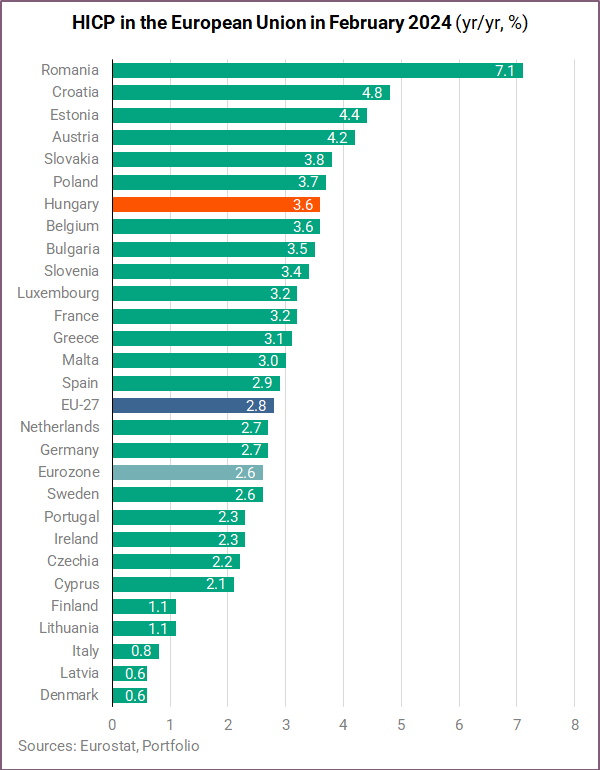
Compared to January, inflation dropped in 20 member states, remained flat in five and rose in two.
In February, the highest contribution to the annual euro area inflation rate came from services (+1.73 percentage points, pp), followed by food, alcohol & tobacco (+0.79 pp), non-energy industrial goods (+0.42 pp) and energy (-0.36 pp).
Regional comparison
HICP – All items
You will find two types of charts below. The upper ones compare inflation in Hungary and in the EU between January 2022 and February 2024. The lower ones put Hungary on a regional map so to speak, but on a shorter period: between August 2022 (when consumer prices really started to take off in Hungary) and February 2024.
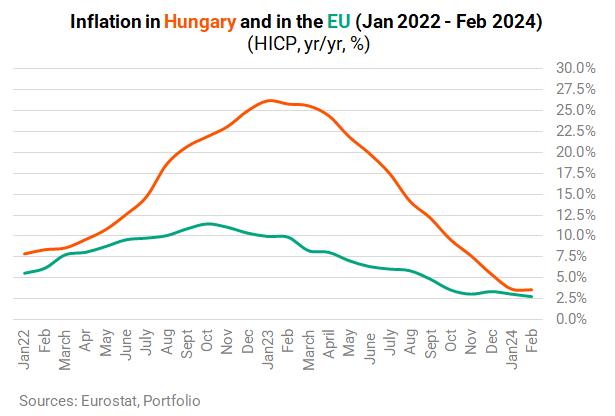
In the CEE region, Hungary had the highest HICP until November last year, when Czechia took over (8.0% vs. Hungary’s 7.7%). By February month, Hungary’s annual inflation rate was “only” the sixth highest among the eight EU members states selected, with lower rates found only in Czechia (2.2%) and Slovenia (3.4%).
Food, non-alcoholic beverages
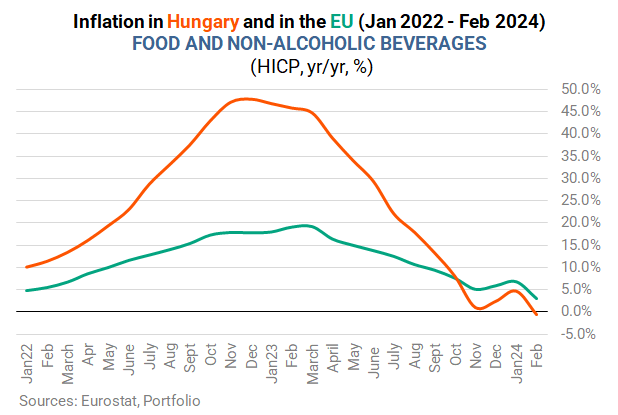
The turnaround in the region came about in October, when Hungary’s food inflation (8.0%) was no longer the highest in CEE, with Poland (9.2%), Slovakia (9.0%), and Croatia (8.9%) reporting higher figures. Hungary’s yr/yr index came in at -0.6%, with an even better reading only in Czechia (-4.9%). Note, however, that food inflation in February 2023 was just down at a whopping 45.9% from the Dec22 peak of 47.9%. In comparison, Czechia’s food inflation peaked at 28.2% in March last year.
Alcoholic beverages, tobacco
Hungary’s HICP in this product group was still well over the EU average in January, but dipped under it last month. The price increase here was still on its way up (18.7%) in Feb23 to the 20.4% peak reached in April.
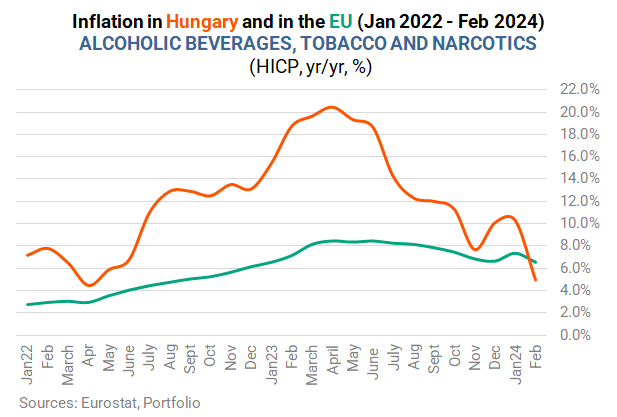
In a regional perspective, Hungary lost its top ranking temporarily in November, but has since regained it in this product group, although its lead over Poland was very small in January, and the February print (+5.0%) was already the second lowest behind Czechia’s 4.1%.
Transport
Following a highly interesting 5.1% drop in transport prices in November 2023, inflation in this product group quickly and drastically rebound and reached 11% in January this year, versus the EU average of only 0.8%. However, it once again turned down and actually dropped 0.5% versus the +1.5% EU average. Note that the index was extremely high a year ago (+25.4% in Jan and +22.6% in Feb 2023).
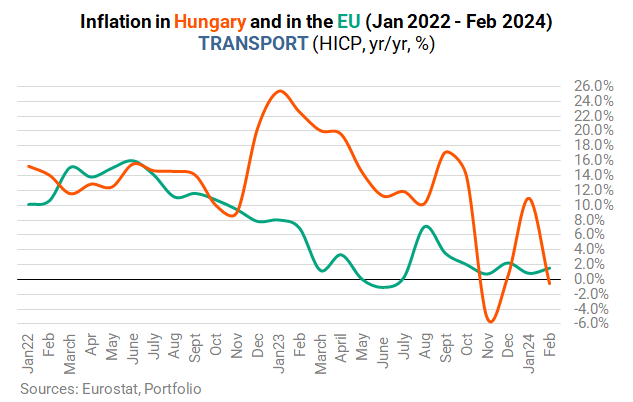
The yr/yr change in transport price was negative last month only in Hungary (-0.5%) and Poland (-1.2%).
Restaurants and hotels
The annual index in this category hit its lowest at 11.1% after peaking at 31.2% in April, but picked up to 14.8% in January only to retreat to 9.8% in February. The EU average also fell to 5.7% after a pick-up to 6.5%.
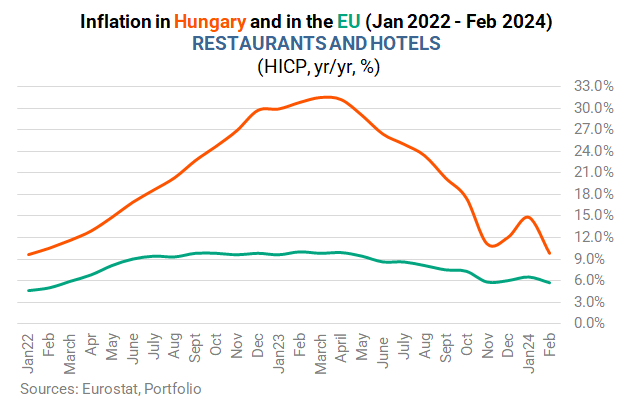
Hungary was on the 2nd spot in November and on the 3rd in December in the CEE ranking, but got itself back on top in January month and snatched the ‘bronze medal’ in February (9.8%) behind Croatia (10.8%) and Romania (12.5%).
Recreation and culture
The gap between the annual change in prices in this category Hungarian and EU widened to nearly 13 percentage points last April, but it narrowed to 4.9ppts in November. This particular index fell both in Hungary and in the bloc in February, and the gap was only 3.7ppts.
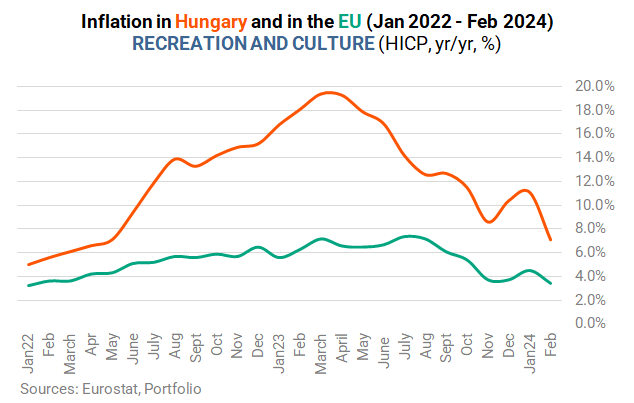
In this category, Hungary has not ‘given up’ its leading position in CEE until last month, and finished 1.4ppts lower in February than Romania which has been the runner-up since September.
Services
Services inflation peaked at 19.1% in Hungary in April 2023, more than three times as high as the EU average (6.1%). Since then the Hungarian figure has been dropping until December when it picked up 1ppt to 10.2%. It was followed by a moderate increase to 10.4%, while the EU reading rose a lot more, to 6.5% from 6.0%. The Feb print shows moderation to 5.7% in the EU and to 9.8% in Hungary.
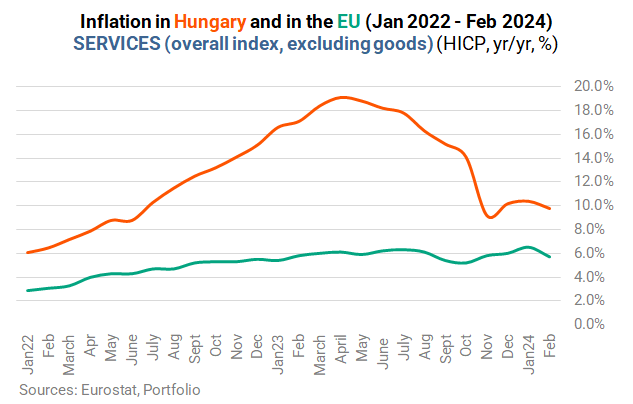
In regional terms, Hungary came in 3rd after Croatia (10.8%) and Romania (12.5%).
Cover photo: Getty Images






